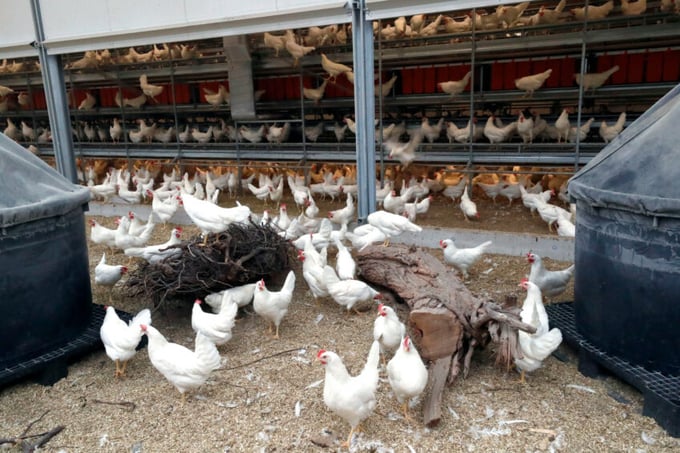November 25, 2025 | 07:19 GMT +7
November 25, 2025 | 07:19 GMT +7
Hotline: 0913.378.918
November 25, 2025 | 07:19 GMT +7
Hotline: 0913.378.918
However, Lidl has to import the eggs from Dutch producer Kipster because it could not find any Belgian poultry producer willing to start such an environmentally-friendly chicken farm, the company says.

Kipster, launched in 2017, has become a bright beacon for sustainable future-proof agriculture. Photo: Bert Jansen.
Lidl wants to introduce Belgian consumers to the climate-neutral eggs from Kipster, in its own words the most environmentally-conscious chicken farmer in the world. “Although the Kipster concept meets the aim of the government towards an increasingly sustainable agriculture, we couldn’t convince farmers or find suitable locations. We hope that, by offering these eggs on the Belgian market, we can help to set in motion the egg production in Belgium and redraw it towards sustainability,” says Isabelle Colbrandt, spokesperson for Lidl Belgie.
Kipster, launched in 2017, has become a bright beacon for sustainable future-proof agriculture, Lidl says. The main purpose is not to produce as many eggs as possible for the lowest possible price, but to produce eggs with respect to animal, nature and humans. The animals can roam freely both outdoors and indoors. All energy comes from solar panels while the chickens are fed food waste from nearby bakeries and other food companies.
Co-founder Ruud Zanders: “Commercial animal-friendly livestock farming is almost impossible. We do realise that. But we can offer our animals as much a good a life as possible. The instinct of the chicken is leading when designing our farms. In the past, chickens roamed freely on the farm yard and ate whatever they could find. That’s what we try to do, too.”
Zanders adds that all eggs from Kipster are white. “That’s better for the environment because they need far less feed.”
Kipster and Lidl Belgium have, in close cooperation, tried for 5 years to get the concept of environmentally-conscious farms off the ground in the country. After a long search, they had to give up the idea.
“We were very much charmed by the innovative project and started very quickly to talk about a farm in Belgium. We want to offer as many Belgian products in our shops as possible. If we can’t get them produced here, then we’re going to look for alternatives. Because we wanted the Belgian consumers to get to know these eggs, we now offer them from the Netherlands,” says Colbrandt.
Lidl stresses that the climate-neutral eggs, with a price tag of €2,26 for half a dozen, are not more expensive than the organic eggs it sells.
(PW)

(VAN) An Giang promotes supply-demand connections, standardizes quality and builds value chains, creating a foundation for sustainable bird’s nest development and aiming to expand exports.
/2025/11/24/5339-4-nongnghiep-075331.jpg)
(VAN) Recently, the conference on 'Sustainable Fisheries Linkage Chain - Tilapia for Export' took place in Tien Hai commune, Hung Yen province.
/2025/11/21/4309-2-153400_128.jpg)
(VAN) Green and low-emission rice is paving the way for Vietnamese rice to enter high-end markets, marking the beginning of a transformation journey toward greening and elevating the national rice brand.

(VAN) ‘Right to Win’ outlines a national action plan that shapes a new vision for Viet Nam’s agriculture in an era of renewal and global integration.

(VAN) Lam Dong’s farmed sturgeon output this year is expected to reach 2,300 tons, worth VND 450 billion, affirming the brand’s position on the market.

(VAN) A surge in Ukrainian egg exports, largely driven by soaring sales to the UK over the last few years, has notably pushed up egg prices on the domestic market.

(VAN) The price of Arabica Catimor coffee in Quang Tri is currently at VND 25,000–27,000/kg (fresh cherries), the highest level ever recorded